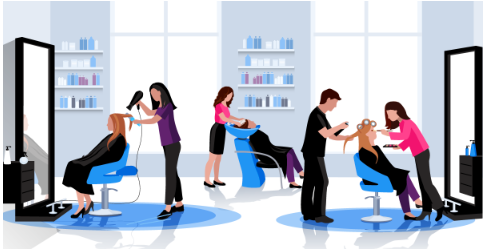The salon industry has undergone a significant transformation in recent years, thanks to the integration of cutting-edge technology in its operations. With technology revolutionizing almost every aspect of our lives, it’s no surprise that salons are also benefiting from its advances. The industry has embraced new innovations, such as advanced beauty treatments and state-of-the-art equipment, to offer customers a luxurious and convenient spa experience. These advancements have also led to increased efficiency, affordability, and customer satisfaction, making salons into thriving businesses that redefine comfort and convenience for their clients.
Automation and efficiency
The salon industry has experienced significant changes and advancements through technology, particularly in terms of automation and efficiency and here are some ways in which salon software has impacted the salon industry:
- Online booking systems: Many salons now offer online booking systems, allowing customers to schedule appointments conveniently from their smartphones or computers. Salon software reduces the time and effort required for both clients and salon staff to manage appointments manually.
- Point of sale (POS) systems: Advanced POS systems are now prevalent in salons, enabling efficient and accurate transaction processing. These salon and spa software often integrate with inventory management, allowing salon owners to monitor stock levels and automate reordering.
- Customer management software: Salon and spa software helps automate customer-related tasks such as record keeping, tracking customer preferences, and maintaining a database of client information. This technology streamlines customer interactions, making it easier to provide personalized services.
- Automated marketing and communication: Technology revolutionized salon marketing through automated email campaigns, social media scheduling tools, and CRM systems, enabling effective targeting and promotion.
- Advanced equipment and tools: Innovative salon tools and equipment, like advanced hair dryers, straighteners, curlers, and color-mixing machines, have improved efficiency and precision, ensuring faster processes and better results.
- Inventory and supply chain management: Technology simplifies inventory tracking and supply chain management for salons via automated systems that monitor stock levels, generate reorder notifications, and streamline procurement, reducing the risk of running out of essential products.
- Virtual consultations and augmented reality: Virtual consultations enable salons to offer remote assessments and advice. Augmented reality (AR) technology allows customers to visualize different hairstyles, colors, or makeup looks, enhancing their decision-making process.
- Data analytics and business insights: Salon owners can leverage data analytics tools to gain insights into customer behavior, sales trends, and operational efficiency, making data-driven decisions to improve services, optimize resource allocation, and identify growth opportunities.

Personalized client experiences
Technology has enhanced personalized client experiences in the salon industry in the following ways:
- Customer profiles and preferences: Salon software creates customer profiles with preferences and past services, enabling personalized recommendations and tailored services.
- Virtual hair and makeup simulations: AR and VR technology allow clients to visualize hairstyles, colors, and makeup looks before deciding, helping them make informed choices that suit their preferences.
- Personalized product recommendations: Data analytics and customer management systems enable salons to provide personalized product recommendations based on individual needs and preferences, enhancing the client experience and ensuring suitability.
- Automated reminders and follow-ups: Salons automate reminders and follow-ups through text messages or emails, keeping clients informed and engaged, which strengthens relationships and demonstrates excellent customer service.
- Digital consultations and communication: Stylists communicate with clients via video calls or chat platforms to discuss desired looks, provide recommendations, and answer questions, ensuring client needs are understood even before visiting the salon.
- Customized loyalty programs: Technology enables salons to implement customized loyalty programs with digital cards, reward points, and personalized promotions, enhancing client experience and encouraging repeat visits.
- Real-time feedback and reviews: Online platforms and review websites allow clients to provide real-time feedback and reviews, helping salons understand preferences, address concerns, and improve services.
Digital Marketing and Online Presence
Digital marketing and online presence have transformed the salon industry in the following ways:
- Increased visibility and reach: Digital marketing expands salon reach beyond local advertising by utilizing online channels like search engines, social media, and directories to attract a wider audience and new customers.
- Targeted advertising: Digital marketing enables precise targeting of demographics, interests, and locations for salon advertising, reaching the most relevant audience and increasing the likelihood of attracting interested potential clients.
- Social media marketing: Social media is essential for salons to build an online presence, showcase work, engage with clients, and encourage user-generated content, enhancing visibility.
- Online booking and scheduling: Technology simplifies salon appointment booking with online systems, integrated into websites and social media profiles, streamlining the process for clients and reducing administrative tasks for staff.
- Online reviews and reputation management: Online platforms and review websites allow clients to leave reviews, build a reputation, and attract new customers, while negative reviews provide opportunities for improvement.
- Content marketing and educational resources: Salons use content marketing to establish expertise, build trust, and share valuable tips and advice through blog posts, videos, and tutorials, positioning themselves as reliable sources of information.
- Email marketing and customer retention: Salons use email marketing to stay connected with existing clients, sharing updates, special offers, and personalized campaigns to increase customer retention and encourage repeat visits.
- Online sales and e-commerce: Salons utilize e-commerce platforms to sell branded products, expand revenue streams and reach online shoppers.
Training and professional development
Technology transforms salon training and professional development, revolutionizing how workers improve their skills through:
- Online training platforms: Technology makes training accessible and convenient through online platforms. Salons provide staff with e-learning courses, tutorials, and webinars, allowing flexible learning and skill acquisition on the latest techniques and trends.
- Virtual reality (VR) and augmented reality (AR): VR and AR technologies provide immersive training experiences in salons. Virtual reality simulates salon environments for hands-on practice, while augmented reality offers step-by-step guidance during training sessions.
- Mobile apps and digital resources: Mobile apps and digital resources offer on-the-go access to training materials, product information, and educational content for salon workers, facilitating continuous learning and quick reference during work.
- Live webinars and virtual workshops: Technology facilitates live webinars and virtual workshops for salon professionals, providing interactive learning, real-time feedback, and networking opportunities among workers and industry experts.
- Social media and online communities: Salon workers can utilize social media and online communities to connect, collaborate, and learn from industry peers by joining groups, following influential stylists, and participating in discussions that can keep workers updated on trends, techniques, and professional tips.
- Digital assessments and certifications: Technology allows for online assessments and certifications, which makes it easier for salon workers to validate their skills and earn certifications without attending physical training centers.
Final Thoughts
While there are many salon software programs available, PosBook has been in the beauty care market since 2009, PosBook is the best salon software which salon owners can depend on, customers can be billed very fast with no waiting and also stay connected with their needs ahead of time by booking appointments.
Customers will appreciate being sent reminders of special days, visits and seasonal campaigns. Being one of the best salon software also helps to track the performance and attendance of employees while managing salary and commission plans. Managing inventory is made more accessible and daily, weekly, monthly sales numbers can be compared for better strategizing purposes.
Tagged in:
salon







